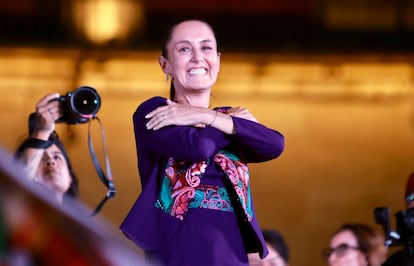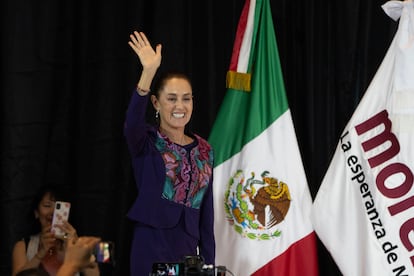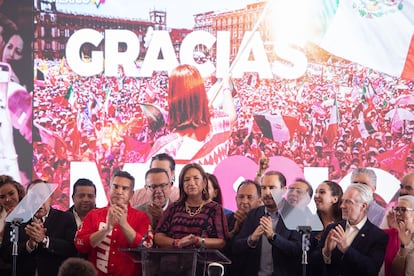Claudia Sheinbaum, the first female president of Mexico
A woman will lead the country for the first time in history. President López Obrador’s successor has won a second term for the National Regeneration Movement and stifled the conservative coalition’s aspirations


Mexico has a new president. Claudia Sheinbaum Pardo, 61, is the first woman to win a presidential election in the 200 years since the country’s independence. It was a historic election day in many ways. With a turnout close to 61%, the successor of President Andrés Manuel López Obrador achieved between 58.6% and 60.7% of the vote, according to the quick count, a mathematical extrapolation based on voting records collected throughout the country that usually yields accurate results. The percentage obtained by Sheinbaum exceeds the 53% achieved by Andrés Manuel López Obrador in 2018, quite an achievement for a candidate with less political charisma. Many questioned whether a sexist country like Mexico was ready to have a female president. The results at the ballot box proved that it is.
As the polls tenaciously predicted, the president’s successor has won by more than 30 points over her opponent from the conservative wing, Xóchitl Gálvez, who achieved between 26% and 28%. The candidate of the opposition coalition — which included the two traditional parties, the Institutional Revolutionary Party (PRI) and National Action Party (PAN), together with the minority Party of the Democratic Revolution (PRD) — was not able to overcome the wave of support by voters who decided to give López Obrador’s National Regeneration Movement (Morena) party a second term. Gálvez congratulated Sheinbaum on her win, saying it was a “historic milestone” that Mexico has a female president for the first time, but also warning that she will continue to defend her policies “going out into the streets as many times as necessary.”
The third candidate in the presidential race, Jorge Álvarez Máynez — who was running for the Citizen Movement party, a group with unclear ideological leanings — won around 10% of the vote.

“Mexicans have recognized the results, the convictions and the will of our project,” said Sheinbaum after midnight, in her first speech after learning of the victory. “Mexico has shown that it is a democratic country with peaceful elections,” she added. She then thanked the calls from her opponents ackowledging her victory. And she congratulated herself for being the first woman to reach the presidency: “I do not arrive alone, all of us women have arrived here,” she said. She promised to govern for each and every citizen. “We will have to walk in peace and harmony for a more prosperous and just country.”
It is an overwhelming victory. Sheinbaum announced that Morena and its allies from the Labor Party and the Greens won a qualified majority in Congress and “probably in the Senate too,” which will give her almost omnipotent power. And not just her. The outgoing president, López Obrador, will have one month between the formation of Congress on September 1 and the end of his term on October 1 to approve pending reforms, for which two thirds of the Chambers are required, since they imply constitutional reforms.

López Obrador himself was the first to congratulate his successor. In a video, he described Sheinbaum as the “winner by a wide margin, the first female president of Mexico” and possibly, he said, the presidential candidate who has won the most votes in Mexico’s history. “I congratulate all Mexicans, the name of Mexico is flying high,” he said.
Some time earlier (the results were announced around midnight), congratulations had already begun to arrive from the presidents of other Latin American countries, such as Colombia, Honduras, Guatemala, as well as from the president of the Organization of American States (OAS), Luis Almagro.
The PRI has become the fourth-strongest political force, a major blow to what was once the only party in Mexico. The group has been steadily losing support in each election, although it is holding its own despite the continuous predictions that it will be wiped off the political map. In the last few months, many PRI senators left the party and during the campaign, it also suffered some significant losses, with some members moving to other parties. The Greens — whose reputation among the public is as bad as the PRI’s — have, however, done better in Congress. The Citizens’ Movement was expected to gain ground and take over the PRI’s meager presence, but this has not been the case. The “old politics” — as described by the Citizens’ Movement — managed to hold its ground.
In Sunday’s election, also at stake were the governorships of eight states and the assemblies of the 32 states, as well as the composition of the federal legislative chambers and the mayoralities of all of Mexico. In total, more than 20,000 public offices were up for grabs. Out of a census of 98 million voters, 15 million were of voting age for the first time. Mexico City was won by the leftist candidate Clara Brugada, who won between nine and 12 points over her rival, PAN candidate Santiago Taboada. The race in the capital was more uncertain, with the two candidates expected to tie. This was not the case. Given Brugada’s wide lead, Taboada has no margin to challenge the results in the courts, as he promised to do if he lost by a margin of less than five points.
Sheinbaum, a university activist in her youth, holds a PhD in energy engineering and served as the head of the government of Mexico City before aspiring to the presidency. Her victory awards a second term for Morena, the party she helped found. With no major shocks on election day and in spite of the violence that has marred the campaign, with 37 candidates murdered, Mexicans have made their choice clear. Gone are the years in which the PRI and PAN alternated power. Sheinbaum will be, in fact, the first person to reach the presidency without having previously been in the PAN or PRI. It is clear that Morena is here to stay and has changed Mexico’s political landscape.
The popularity of López Obrador, who retains a 60% approval rating at the end of his term, boosted Sheinbaum’s candidacy. The closing of her campaign, in Mexico City’s Zócalo, the capital’s main square, felt more like a victory party as her followers heralded the election’s expected result. The opposition turned the elections into a referendum against López Obrador, a dangerous strategy which, in the end, proved to be unsuccessful. The conservative candidate, Xóchitl Gálvez, began her campaign with a moderate tone, insisting that she did not intend to destroy López Obrador’s legacy but rather improve it by keeping what has thus far worked and improving what hasn’t. But in the last few weeks of the campaign, her message veered towards portraying Mexico as being on the brink of a political apocalypse and at risk of losing its democracy. Needless to say, it was not well received by the people, who instead chose to give six more years to a left-leaning administration whose motto continues to be “For the benefit of all, starting with the poor.”

Millions of families have seen their economic conditions improve in the last six years through higher retirement pensions, scholarships for students, disability benefits, and a minimum wage that has increased by an average of 20% per year, well above the Consumer Price Index (CPI), something unseen in previous administrations. In a country still heavily impoverished, these advances made possible by the López Obrador administration have carried the party to a second term: many poor people felt connected to and seen by their government like never before.
Mexico’s economic boom has outweighed concerns about violence in the country. In February, a historical record in foreign direct investment was announced, with more than $36 billion in 2023. Remittances sent by migrants to their families have also been shattering records, helping drive the local economy. Mexico has surpassed China to become the main exporter to the United States, its major trading partner. Nearshoring — the relocation of U.S. companies to Mexican territory — also promises to unleash a flood of new jobs.
López Obrador’s irrefutable victory in 2018 — he won 53% of the vote — left the opposition reeling for a good part of the six-year term, they were leaderless and without a plan. It was only in July of last year that a smiling, spirited woman, wearing flowery huipiles — traditional Mexican blouses — and riding a bicycle renewed the spirits and hopes of the traditional parties. Gálvez, a self-made businesswoman and engineer from humble, rural origins, managed to push aside a whole generation of discredited leaders, who had led both the PRI and PAN astray, and win over the opposition.
The PAN and the PRI, lifelong intimate enemies, were forced to renew their alliance and share a single candidate in order to have a fighting chance in Sunday’s election. But they did not find strength in union. On the contrary, Gálvez has had to fight against the interference of the parties and the public blunders of their leaders. She, who boasts of her ideological independence, needed them to conquer votes on the ground and at the same time repudiated them when they put spokes in her wheels. The first of the three presidential debates left a bitter taste in her mouth. She felt that they were leaving her with no air to breathe and she put her foot down: “I am going to be me and if they want me as I am, then great.” She fought to the end, but to no avail.
Mexico was expecting a female president, the ballot box just had to decide which one. Now the votes are in: Claudia Sheinbaum will take the reins of the country from October 1, when López Obrador will hand her the presidential sash.
Sign up for our weekly newsletter to get more English-language news coverage from EL PAÍS USA Edition
Tu suscripción se está usando en otro dispositivo
¿Quieres añadir otro usuario a tu suscripción?
Si continúas leyendo en este dispositivo, no se podrá leer en el otro.
FlechaTu suscripción se está usando en otro dispositivo y solo puedes acceder a EL PAÍS desde un dispositivo a la vez.
Si quieres compartir tu cuenta, cambia tu suscripción a la modalidad Premium, así podrás añadir otro usuario. Cada uno accederá con su propia cuenta de email, lo que os permitirá personalizar vuestra experiencia en EL PAÍS.
¿Tienes una suscripción de empresa? Accede aquí para contratar más cuentas.
En el caso de no saber quién está usando tu cuenta, te recomendamos cambiar tu contraseña aquí.
Si decides continuar compartiendo tu cuenta, este mensaje se mostrará en tu dispositivo y en el de la otra persona que está usando tu cuenta de forma indefinida, afectando a tu experiencia de lectura. Puedes consultar aquí los términos y condiciones de la suscripción digital.








































